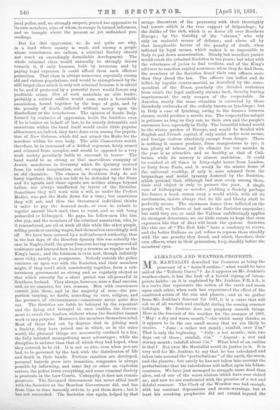THE "EVIL LIFE" SOCIETY.
ENGLAND has been so free from criminal Secret
Societies—Societies, we mean, unconnected with politics —that Englishmen, when they read of such a Society elsewhere, betray the interest of men who are surprised. There have been "Physical Clubs" in this country of the Medmenham Abbey type ; associations of swindlers have been detected working under guidance ; and every now and then " gangs " of thieves, burglars, and other criminals, have been unearthed by the police; but no Secret Society has been discovered banded together for conscious and defiant warfare with the law. The social system has always been pretty strong here, even in the absence of organised police ; and any Society of the kind would be hampered, indeed almost paralysed, by the peculiar English abhorrence of deliberate murder. No Society of the kind could exist for a month if the disobedient were not put to death ; and English villains ordered to murder comrades for doing as they pleased, would probably seek the assistance and advice of the nearest serjeant of police. In the South of Europe, however, where the feeling about murder is more lenient, where it is excessively difficult to inflict capital punishment for anything but mutiny, and where extreme poverty has banded the poor into a sort of corporation, such Societies have been frequent ; and we doubt if the one at Bari now under trial is by any means the only one in Italy, or is unique in anything except perhaps its cynical self- consciousness. The association is obviously a branch of the Camorra, the great Secret Society which under the Bourbons stretched its authority throughout the Neapolitan Kingdom ; and it was probably founded by some cynical criminal, who said to himself, " Evil, be thou my good," and called his local Society openly, " The Evil Life." It was apparently, like the Camorra of Naples, the Mafia of Sicily, and, indeed, all such Societies in Italy, socialistic in theory, had for dogma the thesis that the Have-nots have a right to pillage the Haves, and occasionally, wo should imagine, protected the poor from oppression, thereby averting popular dislike ; but according to the testimony given in Court, its busi- ness was brigandage, black-mailing, and assassination for gain, and the distribution of the income so acquired among the members, according to the degree of their initiation. It had a large number of members, 173 being now under trial, and it had gradually set up a reign of terror which cowed the local police, and, we strongly suspect, proved too oppressive to its own members, nine of whom, to escape it, turned informers, and so brought about the present as yet unfinished pro- ceedings.
But for this oppression, we do not quite see why, in a land where society is weak, and among a people whose consciences are callous, a criminal Society should not reach an exceedingly formidable development. The whole criminal class would naturally be strongly drawn towards it, if only because, both by terrorism and by paying legal expenses, it could afford them such efficient protection. That class is always numerous, especially among old and vicious populations, and would be strengthened by the still larger class which is only not criminal because it is afraid to be, and if protected by a powerful force would favour any profitable crime. Out of such materials, an able leader, probably a retired soldier, would soon make a formidable association, bound together by the hope of gain, and by the penalty of death inflicted without mercy upon the disobedient or the treacherous. The opinion of South Italy, formed by centuries of oppression, holds the traditore even if he is traitor on behalf of law, to be utterly detestable, and executions within the band itself would excite little popular abhorrence, as, indeed, they have done even among the popula- tion of New Orleans, which did not attack the Mafia for the murders within its own body. The able Camorrista would, therefore, be in command of a drilled regiment, fairly armed and released from scruples, and would be opposed to a very weak society peculiarly liable to succumb to terror. The band would be as strong as that marvellous company of Jewish murderers in Germany which De Quincey evolved from his weird imagination, and, we suppose, some hint in an old chronicle. The classes in Southern Italy do not hang together ; the rich are left to be defended by the State and its agents, and those agents are neither always beyond bribes, nor always unaffected by terror of the Societies. Sometimes they will work with a will, as under the Prefect Medici, who put the Mafia down for a time ; but sometimes they will not, and then the threatened individual thinks it safer to pay the demand made, or even to submit to regular annual black-mail, than to resist, and so risk being poinarded or kidnapped. He pays, his fellow-men like him also pay, and the members of the criminal association, who, be it remembered, are all at work all this while like other people, selling goods or earning wages, find themselves exceedingly well off. We have been assured by a well-informed authority, that in the last days of the Bourbon dynasty this was actually the case in Naples itself, the great Camorra having overpowered all resistance and learned how to levy a revenue as regular as the King's taxes ; and the business is even now, though infinitely more risky, nearly as prosperous. Nobody outside the police ventures on open war with the Societies, and their members might, if they could stick consistently together, form a sub- terranean government as strong and as regularly obeyed as that which recently for a short period was all-powerful in Southern Ireland. They always, however, miss a final success, and, as we conceive, for two reasons. Men with consciences cannot join them, and in the majority of men—the pro- portion varying, no doubt, according to race, religion, and the pressure of circumstances—conscience never quite dies out. The Societies are liable to betrayal by the repentant and the dying, and betrayal at once enables the Govern- ment to crush the leaders, without whom the Societies cannot work to any purpose. Moreover, the members themselves rebel. Most of them find out by degrees that in joining such a Society, they have joined one in which, as in the outer world, the pleasant things are necessarily confined to a few, the fully initiated monopolising most advantages; while the discipline is stricter than that of which they had hoped, when they entered, to be rid. It is not so nice, even when you are bad, to be governed by the bad, with the distribution of life and death in their hands. Furious enmities are developed, personal hatreds grow into insanities, vengeance is always possible by informing, and some day or other an explosion arrives, the police learn everything, and some criminal Society is prostrate in the Law Courts. Unhappily, it does not remain prostrate. The Savoyard Government has never allied itself with the Societies as the Bourbon Government did, and has from time to time honestly striven to put them down ; but it has not succeeded. The Societies rise again, helped by that savage discontent of the peasantry with their thoroughly bad tenure which is the true support of brigandage ; by the dislike of the rich, which is so fierce all over Southern Europe ; by the timidity of the "classes," who rely only on material means of defence ; and above all by that inexplicable horror of the penalty of death, when inflicted by legal means, which makes it so impossible in Italy to put down assassination. Steady but merciless justice would crash the criminal Societies in ten years ; but what with the reluctance of juries to find verdicts, and of the King's advisers to sanction capital sentences when they do find them, the members of the Societies dread their own officers more than they dread the law. The officers can inflict and do inflict, by regular courts-martial, as described by the corre- spondent of the Times, precisely the dreaded sentences from which the legal authority shrinks back, thereby leaving imprisonment the only weapon of the respectable. In America, nearly the same situation is corrected by those disorderly outbreaks of the orderly known as lynchings ; but in Italy a case of lynching, owing to the fissures between classes, would produce a servile war. The respectables submit in patience as long as they can, to their own and the people's enormous loss, especially in Sicily. The beautiful island would be the winter garden of Europe, and would be flooded with English and French capital, if only social order were secure, and foreign visitors absolutely exempt from danger. There is nothing it cannot produce, from mangosteens to rye; it has plenty of labour, and its climate for ten' months in the year is as attractive and as healthy as that of Cali- fornia, while its scenery is almost matchless. It could be reached at all times in forty-eight hours from London, or forty from Paris, and it would be the winter home of the universal wealthy, if only it were released from the brigandage and social tyranny fostered by the Societies, which pretend that, although bad men creep among them, their real object is only to protect the poor. A single case of kidnapping or murder, yielding a Society perhaps five francs a head, scares away a world which, with all its carelessness, insists always that its life and liberty shall be perfectly secure. The enormous losses thus inflicted on the people will, we believe, at last make the Societies unpopular ; but until they are, or until the Vatican unfalteringly applies its strongest deterrents, we see little reason to hope that even exposures like that of Bari will break the system. Societies like this one of "The Evil Life" have a tendency to revive, and the better Italians as yet refuse to repress them steadily with the one penalty they dread, and which, therefore, their own officers, wiser in their generation, keep steadily before the members' eyes.



































 Previous page
Previous page